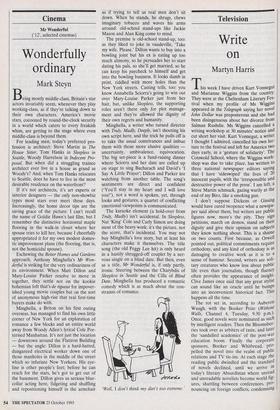Cinema
Mr Wonderful (`12', selected cinemas)
Wonderfully ordinary
Mark Steyn
Being mostly middle-class, Britain's star actors invariably seem, whenever they play working-class, as if they're talking down to their own characters. America's movie stars, cocooned by round-the-clock security in a world which caters to every freakish whim, are getting to the stage where even middle-class is beyond them.
For leading men, today's preferred pro- fession is architect: Steve Martin in The House Sitter, Tom Hanks in Sleepless in Seattle, Woody Harrelson in Indecent Pro- posal. But when did a struggling trainee architect ever live in a house as grand as Woody's? And, when Tom Hanks relocates to Seattle, does he have to live in the most desirable residence on the waterfront?
If it's not architects, it's art experts or interior designers — the only non-showbiz types most stars ever meet these days. Increasingly, the home decor tips are the saving grace of the picture: I can't recall the name of Goldie Hawn's last film, but I remember the distinctive horizontal maple flooring in the walk-in closet where her spouse tries to kill her, because I cheerfully appropriated it for my own modest domes- tic improvement plans (the flooring, that is, not the homicidal spouse).
Eschewing the Better Homes and Gardens approach, Anthony Minghella's Mr Won- derful is striking for the very ordinariness of its environment. When Matt Dillon and Mary-Louise Parker resolve to move in together, they settle not on the kookie bohemian loft that's de rigueur for impover- ished young movie couples but on the sort of anonymous high-rise that real first-time buyers make do with.
Minghella, a Briton on his first outing overseas, has managed to find his own little corner of New York for an exploration of romance a few blocks and an entire world away from Woody Allen's lyrical Cole Por- terised Manhattan. It's not just the location — downtown around the Flatiron Building
— but the angle; Dillon is a hard-hatted, dungareed electrical worker down one of those manholes in the middle of the street which so infuriate New Yorkers. His eye- line is other people's feet; before he can reach for the stars, he's got to get out of the basement. Dillon gives us serious blue- collar acting here, fidgeting and shuffling and repositioning himself in the armchair as if trying to tell us real men don't sit down. When he stands, he shrugs, chews imaginary tobacco and waves his arms around: old-school stand-ups like Jackie Mason and Alan King come to mind.
The premise is old-school stand-up, too: as they liked to joke in vaudeville, 'Take my wife. Please.' Dillon wants to buy into a bowling joint but his ex is eating up too much alimony, so he persuades her to start dating his pals, so she'll get married, so he can keep his paycheck to himself and get into the bowling business. It looks dumb in print, riddled with more holes than the New York streets. Casting tells, too: you know Annabella Sciorra's going to win out over Mary-Louise Parker just from her hair, but, unlike Sleepless, the supporting roles aren't there only for plot manage- ment and they're allowed the dignity of their own regrets and humanity.
Minghella, a writer who turned director with Truly, Madly, Deeply, isn't shooting his own script here, and the trick he pulls off is to take the usual contrivances and imbue them with those more elusive qualities uncertainty, ambivalence, equivocation. The big set-piece is a fund-raising dinner where Sciorra and her date are called up on stage to sing Bacharach and David's 'I Say A Little Prayer'; Dillon and Parker are watching from another table. The song's sentiments are direct and confident (`You'll stay in my heart and I will love you!'), not a word is spoken, yet, through looks and gestures, a quartet of conflicting emotional viewpoints is communicated.
The karaoke element (a hold-over from Truly, Madly) isn't accidental. In Sleepless, Nat 'King' Cole and Carly Simon are doing most of the heavy work: it's the picture, not the score, that's incidental, You may not buy Minghella's love story, but at least his characters make it themselves. The title song (the old Peggy Lee hit) is only heard in a hastily shrugged-off couplet by a ner- vous single on a blind date. But then, even as a title, Mr Wonderful is, if only partly, ironic. Steering between the Charybdis of Sleepless in Seattle and the Cilia of Blind Date, Minghella has produced a romantic comedy which is as much about the con- straints of romance.
`Well, I don't think my diet's too extreme.'


































































 Previous page
Previous page